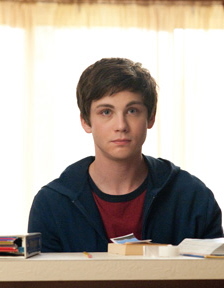
How rare a thing it is when a novelist gets to direct a film based on his own work. Stephen King did it with Maximum Overdrive (based on Trucks) and then never again. It’s clear the same fate won’t befall Steve Chbosky, whose The Perks of Being a Wallflower is itself an adaptation of his own 1999 book of the same name. A charming film that’s anchored by a powerful starring turn by Logan Lerman, Perks is the kind of wonderfully reaffirming fare that reminds you to just chill the fuck out and let the occasional film wash over you.
As we learn through a series of letters to an anonymous pen pal, Charlie (Lerman) begins his first year of high school isolated and alone. His only friend in the world has died. He’s awash in a sea of politics and a popularity contest he can’t begin comprehend. So he doesn’t really try. Salvation arrives in the form of Sam (Emma Watson) and her gay step-brother Patrick (Ezra Miller) as they take him into their circle of hipster elite. In his first year of high school, Charlie finds himself experimenting with drugs, broadening his worldview, struggling with his love for Sam, and coming to terms with some hard truths that threaten to unravel both his family and himself.
 Truth be told, Perks couldn’t start out less promising. Chbosky introduces us to the setting and his players in the most rudimentary of ways – leading you to believe this is high-school film thinking it’s smarter than it really is. Its biggest trapping is evidenced right from the start: these kids, Charlie especially, are too self-knowing. We’ve all been that age. Kids are stupid; a mess of hormones, self-doubt and doofy aimlessness caught between the pains of adolescence and responsibilities of adulthood. At least in the early-going, these kids would feel just as at home as art majors at NYU as they do teens struggling to get into college.
Truth be told, Perks couldn’t start out less promising. Chbosky introduces us to the setting and his players in the most rudimentary of ways – leading you to believe this is high-school film thinking it’s smarter than it really is. Its biggest trapping is evidenced right from the start: these kids, Charlie especially, are too self-knowing. We’ve all been that age. Kids are stupid; a mess of hormones, self-doubt and doofy aimlessness caught between the pains of adolescence and responsibilities of adulthood. At least in the early-going, these kids would feel just as at home as art majors at NYU as they do teens struggling to get into college.
But part of the enjoyment I got out of Perks was watching these people grow from flimsy caricatures to engrossing human beings – kids whose lives are revealed far deeper than the surface level. While I was never completely convinced of the realities of the setting these characters find themselves, the feelings and difficulties they encounter wring some very heavy emotions. It doesn’t help that these actors are twenty-somethings who look and act like twenty-somethings (especially considering we’ve been watching a few of these performers for years). But in trading away a small sliver of believability, Chbosky lands comfortably with a cast of capable performers that draw you into an increasingly engrossing and entertaining world. And that’s where the gamble pays off.
Lerman plays Charlie as a shy introvert who sees the world more than it’s willing to see him (hence the “wallflower” label). He’s adopted almost out of pity by Sam and her friends, but it’s quickly apparent that these people are as drawn to him as he is them. Lerman carries it all spectacularly. These are damaged people, none more so than Charlie. What’s so engrossing about the performance is how the actor injects this likable and affable kid with ever-increasing volatility that not even his friends are aware of. There’s so much conflict in Charlie’s small frame that his restlessness becomes shared by the audience. Are we watching him get better or simply stave off a meltdown? The whys and hows of Charlie’s pain are revealed slowly and heartbreakingly – forcing him to confront truths that, when fully-realized, force you to change your perceptions of everything you just watched.

Equally effecting is Ezra Miller as the hilarious and conflicted Patrick. This film has a lot going on, but I found Patrick and his story to be the most engrossing. Patrick isn’t hiding the fact that he’s gay, a decision made braver considering the film is set in the 90s. His boyfriend Brad however is still very much entrenched in the closet. Miller, besides providing the film some much needed levity, is something of a tragedy in his own right. I find it interesting that his narrative isn’t wrapped in a bow by our conclusion. His conflicts and feelings of guilt are baggage still in tow even by the time we roll credits.
 Less impressive is Emma Watson, whose sly, coquettish Sam is played without some necessary depths. This being one of the star’s first turn post-Potter turns, I can give her a pass as it’s still clear to see why Charlie loves the character if not the actress inhabiting her. Watson’s performance is flat for stretches and sticks out like a sore thumb amidst the more realistic work being done. Unfortunate and surprising, Watson simply feels like the wrong actress for the material she delivers the one performance in the film that never truly connects. Which isn’t to say she’s terrible here, on the contrary. It’s just clear that the actress struggled to find footing with the material.
Less impressive is Emma Watson, whose sly, coquettish Sam is played without some necessary depths. This being one of the star’s first turn post-Potter turns, I can give her a pass as it’s still clear to see why Charlie loves the character if not the actress inhabiting her. Watson’s performance is flat for stretches and sticks out like a sore thumb amidst the more realistic work being done. Unfortunate and surprising, Watson simply feels like the wrong actress for the material she delivers the one performance in the film that never truly connects. Which isn’t to say she’s terrible here, on the contrary. It’s just clear that the actress struggled to find footing with the material.
Perks is at its best when its exploring the complexities of its interpersonal relationships. The awkwardness as Charlie accidentally falls into a relationship with friend Mary Elizabeth (played by the excellent Mae Whitman) or the seething undercurrent of dislike permiating whenever Sam’s college boyfriend comes to visit. After a mildly rough start, Perks becomes an easy world to get drawn into for 102 minutes – thanks in no small part to the fact that Chbosky’s been with these characters for fifteen years. By the end it’s built into an extremely emotional experience. The Perks of Being a Wallflower reveals itself as the sort of soulful work that washes over you – often hilarious, at times heart-wrenching, but always satisfying.
Rating: 




Out of a Possible 5 Stars